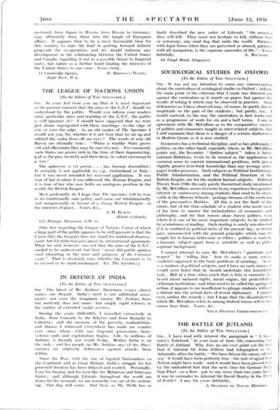SOCIOLOGICAL STUDIES IN OXFORD [To the Editor of THE SPECTATOR.]
SIR,—It was not my intention to cause any misconception about the curriculum of sociological studies in Oxford ; indeed, the main point of the criticism that I made was directed not against the curriculum as it stands on paper, but against the results of taking it which may be observed in practice. Suck deficiencies as I have observed may, of course, be partly due to ineptitude on the part of the students ; but partly, too, I would contend, to the way the curriculum in fact works out as a programme of work for six and a half terms. I am in agreement with Mr. McCallum as to the comparative success of politics and economics taught as inter-related subjects, but I still maintain that there is a danger of a certain shallowness in Modern Greats as it is now studied.
Economics has a technical discipline, and so has philosophy ; politics, on the other hand, especially where, as Mr. McCallum points out, the favourite " further subject'' taken is Inter- national Relations, tends to be treated as the application of common sense to current international problems, with just a slightly greater text-book knowledge than any average news- paper reader possesses. Such subjects as Political Institutions, Public Administration, and the Political Structure of the British Empire, are for the student factual subjects. Political Theory from 1760, the only purely theoretical study mentioned by Mr. McCallum, seems to excite in my experience less genuine interest or controversy among students than used to be obser- vable in the History Schools—perhaps because of the exclusion of the provocative Hobbes. All this is not the fault of the tutors, but of the time-schedule of a student who needs most of his time to master the technicalities of economics and philosophy, and for that reason alone leaves politics, even where it is one of his more important subjects, to be studied by a minimum of reading. Such reading is surely mis-directed if it is confined to political facts of the present day, or recent past, unconnected with' the general principles which may he sought for in human behaviour or ethics ; polities is scarcely a humane subject apart from a scientific as well as philo- sophical background.
I cannot attempt to earn Mr. McCallum's " gratitude and respect " by telling him " how to make a more serious academic approach to the basic problems of sociology. As. he is a student of political subjects, and I have no such claims. it would seem fairer that he should undertake this formidable task. But at a time when much that is fake is currently Is about national rights, racial origins, the perfectibility of human institutions, and what used to be called the springs of action, it appears to me insufficient to plunge students without a thread into the actual facts of recent diplomacy. I cannot even outline the remedy ; but I hope that the dissatisfaction which Mr. McCallum refers to among Oxford tutors will in due course hear fruit.—Yours, &c., YOUR OXFORD CORRESPONDENT.






















































 Previous page
Previous page